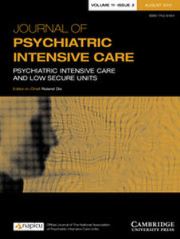Article contents
Violence, malignant catatonia or anti-NMDA receptor encephalitis: a case report
Published online by Cambridge University Press: 23 August 2011
Abstract
We present the case of a 25-year-old woman who initially presented after committing an assault resulting in serious injury. She exhibited recent onset psychiatric symptoms which were later followed by a rapid deterioration in her physical health. She was treated with electroconvulsive therapy on a medical intensive care unit for a presumptive diagnosis of malignant catatonia. A test for anti-NMDA receptor antibodies returned positive. She was treated with IV immunoglobulin (IVIg) and high dose steroids, then underwent a left ovarian cystectomy. She was subsequently treated on a psychiatric intensive care unit until discharge.
Keywords
- Type
- Case Report
- Information
- Copyright
- Copyright © NAPICU 2011
References
- 1
- Cited by




